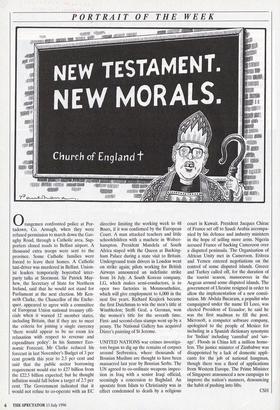PORTRAIT OF THE WEEK
Orangemen confronted police at Por- tadown, Co. Armagh, when they were refused permission to march down the Gav- aghy Road, through a Catholic area. Sup- porters closed roads to Belfast airport. A thousand extra troops were sent to the province. Some Catholic families were forced to leave their homes. A Catholic taxi-driver was murdered in Belfast. Union- ist leaders temporarily boycotted inter- party talks at Stormont, Sir Patrick May- hew, the Secretary of State for Northern Ireland, said that he would not stand for Parliament at the next election. Mr Ken- neth Clarke, the Chancellor of the Exche- quer, appeared to agree with a committee of European Union national treasury offi- cials when it warned 12 member states, including Britain, that if they are to meet the criteria for joining a single currency `there would appear to be no room for relaxation with respect to revenue and expenditure policy'. In his Summer Eco- nomic Forecast, Mr Clarke reduced his forecast in last November's Budget of 3 per cent growth this year to 2.5 per cent and said that the public sector borrowing requirement would rise to £27 billion from the £22.5 billion expected; but he thought inflation would fall below a target of 2.5 per cent. The Government indicated that it would not refuse to co-operate with an EC
directive limiting the working week to 48 Hours, if it was confirmed by the European Court. A man attacked teachers and little schoolchildren with a machete in Wolver- hampton. President Mandela of South Africa stayed with the Queen at Bucking- ham Palace during a state visit to Britain. Underground train drivers in London went on strike again; pilots working for British Airways announced an indefinite strike from 16 July. A South Korean company, LG, which makes semi-conductors, is to open two factories in Monmouthshire, which will give employment to 6,000 in the next five years. Richard Krajicek became the first Dutchman to win the men's title at Wimbledon; Steffi Graf, a German, won the women's title for the seventh time. First- and second-class stamps went up by a penny. The National Gallery has acquired Dtirer's painting of St Jerome.
UNITED NATIONS war crimes investiga- tors began to dig up the remains of corpses around Srebrenica, where thousands of Bosnian Muslims are thought to have been massacred last year by Bosnian Serbs. The UN agreed to co-ordinate weapons inspec- tion in Iraq with a senior Iraqi official, seemingly a concession to Baghdad. An apostate from Islam to Christianity was in effect condemned to death by a religious
court in Kuwait. President Jacques Chirac of France set off to Saudi Arabia accompa- nied by his defence and industry ministers in the hope of selling more arms. Nigeria accused France of backing Cameroon over a disputed peninsula. The Organisation of African Unity met in Cameroon. Eritrea and Yemen entered negotiations on the control of some disputed islands. Greece and Turkey called off, for the duration of the tourist season, manoeuvres in the Aegean around some disputed islands. The government of Ukraine resigned in order to allow the implementation of a new consti- tution. Mr Abdala Bucaram, a populist who campaigned under the name El Loco, was elected President of Ecuador; he said he was the first madman to fill the post. Microsoft, a computer software company, apologised to the people of Mexico for including in a Spanish dictionary synonyms for 'Indian' including 'cannibal' and 'sav- age'. Floods in China left a million home- less. The justice minister of Zimbabwe was disappointed by a lack of domestic appli- cants for the job of national hangman, though there was a flood of applications from Western Europe. The Prime Minister of Singapore announced a new campaign to improve the nation's manners, denouncing the habit of pushing into lifts.
CSH


































































 Previous page
Previous page